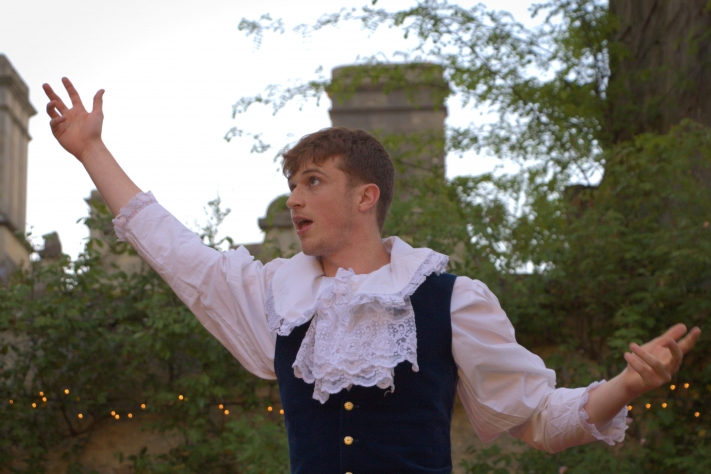At University College, by tradition there stalks a ghost in the guise of Obadiah Walker, a late Master of the College and a contemporary of Nell Gwynn. Probably the evening performance of the play would have been a more propitious time for spotting him, though I did keep an eye open, just in case. Old Obadiah discovered, as did Nell, the fickleness of princes. Just as the historical Nell fell into an early death from syphilis, having spent years trying to protect her position with the King against a myriad of other lovers and hangers-on, so he had adopted the wrong religion at William of Orange's accession, soon falling into penury.
The tone of Jennifer Swale's contemporary Restoration drama was kept fairly upbeat, however, and this rags-to-riches story, from orange-seller at the theatre to mistress No. 1 to King Charles II was presented more as, if not a romp, then a costume drama incorporating music, dance and plenty of theatrical manoeuvring and backbiting. Sure, there are plain references to the marginalisation of women at the time, and of course good looks have been for many a young woman a passport to at least transient success and a bit of glory, if not quite on the scale of Nell Gwynn's jackpot on catching the eye of Charles (£500 a year + house, carriage, a lady in waiting and perks). But these phenomena are not specific to the 17 th century, nor were they hammered home here by the dramatist. In any case, the setting of the Master's Gardens on a dazzling day in May, with its noble Magnolia tree, its borders of Bowl of Beauty peonies, bearded irises and a striking Cornus Alternifolia Variegata, seemed hardly the place or time for didactic social comment.
Swale's script is quite democratic in that it gives a decent crack of the whip to a number of players rather than concentrating the attention on a select few. In this respect it reminded me of Ben Jonson's Bartholomew Fair from earlier in the 17th century rather than the more mannered verbal nimbleness of Congreve or Wycherley with their Way of the World or Country Wife respectively. No doubt conscious of following in the footsteps of Restoration period giants, Swale relied for her humorous effect on anachronistic language ('have I missed something?', 'you need to listen to yourself' and 'no problem') and pointedly funny contemporary references ('Choosing between talking to the Duke of Cambridge and a corpse, I'd choose the corpse every time' and 'The French have arrived and they're driving on the wrong side if the cobbles!').
Director
Emelye Moulton kept the pace moving; occasionally the King's Company became
strung out across the playing space in a static line, but scene changes and
entrances were snappy. The director was ably abetted by delightfully showy costumes from Ellie Thomas and Eleanor On
and by a little of her own composed music from a guitar, recorder and drum trio
(and I could have done with more from them).
The onward movement of the narrative lay substantially in the hands of Nell as we followed her from selling oranges to the groundlings to her auditioning for a part with the Company, and then on through her relations with the King. Martha West acquitted herself well, moving fluently and both speaking and singing (sometimes unaccompanied: not at all easy) clearly, though I thought the script never quite gave her scope to demonstrate just why the King was if not besotted, then firmly enamoured by her. His Royal Majesty in a long periwig was Benedict Turvill, an ever-impressive student actor turning in a portrayal of smooth charm and managing to convey the sense of the King's carapace of dignity concealing an underbelly of lascivious dependency.
Elsewhere, Harold Serero shone as an arch, blusteringly histrionic Kynaston, an actor displaced by Nell, and the excellent Mati Warner squeezed every last drop out of her part as Nancy, Nell's servant. She needs to be seen in much bigger roles. James Walsh was Charles Hart, a kind drama teacher to Nell ('First rule of acting: include your audience') and interesting in that in the personal integrity stakes he quite outdid the King. Katie Cook had the makings of a bitchy Lady Castlemaine, the blue-stocking rival of Nell, but was a bit too low-key. And there were several cameos to admire: a half-crazed Queen Catherine from Julia Sandros-Alper, Emily Wigoder's Louise de Kerouaille, unleashing a flood of French in a formidably accurate accent, and Ella Khan was a bundle of energy as Nell's dishevelled brothel-keeper of a mother.
This was a production brimming with joie-de-vivre and simple spectacle, a treat beneath the old, stone college walls on a sunny afternoon.




